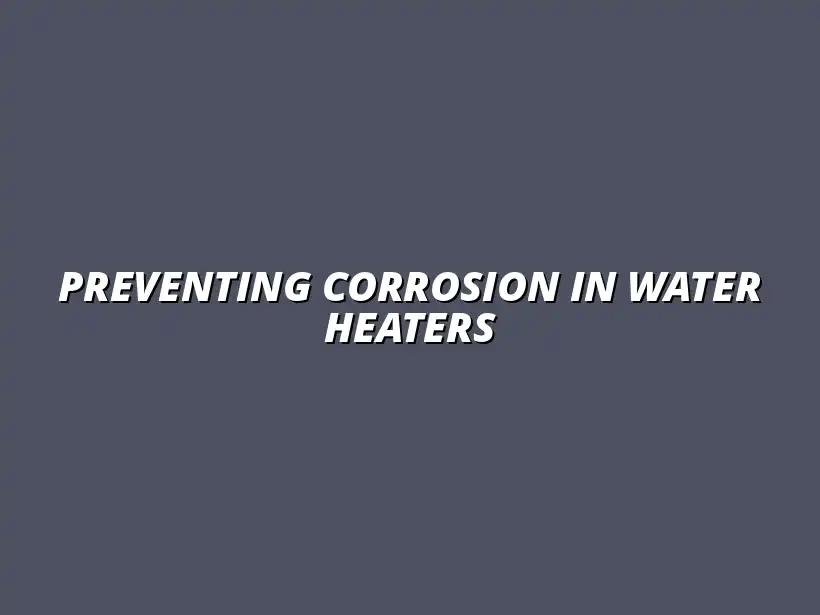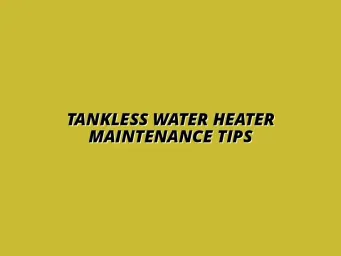
Preventing Corrosion in Water Heaters
Understanding Corrosion in Water Heater Tanks
Corrosion is a natural process that can significantly impact the performance of your water heater. As water heaters age, they become susceptible to various forms of corrosion. Understanding these processes can help you take proactive steps to maintain your water heater and extend its lifespan.
At its core, corrosion occurs when metals react with moisture and other elements in their environment. In a water heater, this usually involves the tank and its components interacting with hot water, which can lead to deterioration over time. Addressing these issues early can prevent costly repairs or replacements down the line!
The Basics of Corrosion and Its Impact on Water Heater Performance
Corrosion can manifest in different ways, often affecting the heater's efficiency and overall performance. When corrosion takes hold, it can lead to leaks, rust, and other problems that reduce the lifespan of your unit. It’s essential to have a basic understanding of how corrosion affects water heaters to recognize early warning signs.
For the best performance, let’s think about how to identify and manage corrosion. Here are some common types of corrosion that may affect your water heater:
- Uniform Corrosion: Evenly distributed corrosion that affects the entire surface.
- Pitting Corrosion: Small, localized areas of corrosion that can lead to holes.
- Galvanic Corrosion: Occurs when two different metals are in direct contact in the presence of water.
Common Types of Corrosion in Water Heater Tanks
Understanding the different types of corrosion helps you identify potential problems early! Uniform corrosion is often the most common, affecting large areas of the tank. In contrast, pitting corrosion can be more dangerous because it creates small holes that might go unnoticed until they cause significant damage.
Galvanic corrosion occurs when dissimilar metals interact. For example, if your water heater has metal components that aren’t compatible, it might lead to accelerated wear and tear. Being aware of these corrosion types can help you take preventive measures. To learn more about maintaining your water heater efficiently, check out these tips on efficient water heater maintenance.
How Corrosion Affects Energy Efficiency and Lifespan
Corrosion not only affects the physical integrity of your water heater but also its energy efficiency. When corrosion occurs, it can create barriers that prevent heating elements from functioning effectively. This leads to higher energy bills as the unit works harder to maintain temperature.
Moreover, a corroded tank has a significantly shorter lifespan. Investing time in maintenance and inspections can help mitigate these issues, leading to a more reliable and efficient water heater. Remember, the sooner you identify corrosion, the easier it is to manage!
Identifying Signs of Corrosion in Your Water Heater
Being proactive about identifying signs of corrosion in your water heater can save you time, money, and hassle. Regularly checking for specific indicators will help you catch problems early on. So let’s look out for some visual clues!
Visual Indicators of Corrosion to Watch For
There are several visual signs of corrosion that you should keep an eye on. Some early indicators include:
- Rust: Look for reddish-brown discoloration on the tank.
- Pitting: Small holes or indentations on the metal surface.
- Flaking Paint: Peeling paint can be a sign of underlying issues.
If you notice any of these signs, it’s essential to investigate further. Early detection can lead to simpler repairs or maintenance actions! For more advice on general plumbing maintenance, consider this helpful guide on essential bathroom plumbing maintenance.
Rust and Pitting: Early Warning Signs
Rust is often the first visual sign of corrosion. When you spot rust on your water heater, it's important to act quickly! Pitting, which appears as small holes, can be even more concerning, as it can compromise the tank's integrity.
Addressing these early warning signs can prevent the need for a complete tank replacement later on. Regular visual inspections can help ensure you catch these issues before they escalate!
Unusual Sounds and Leaks: What They Mean
In addition to visual signs, you might also hear weird noises coming from your water heater. Sounds like popping or rumbling can indicate sediment buildup, which is often a precursor to corrosion problems. Keeping an ear out for these noises is just as important as watching for rust!
Leaks are another serious indicator of corrosion. If you notice water pooling around your water heater, it may be a sign that the tank is compromised. Prompt attention to these signs can help prevent extensive damage to your home! Regular annual water heater inspections are highly recommended.
Frequently Asked Questions About Corrosion and Water Heaters
What Causes Corrosion in Water Heater Tanks?
Corrosion in water heater tanks can be sparked by several factors. One major culprit is the presence of oxygen in the water, which reacts with the metal surface of the tank. Additionally, the type of water you have can influence corrosion; for example, hard water is often more corrosive than soft water due to its mineral content.
Another key factor is the temperature of the water. Higher temperatures can accelerate the corrosion process, especially if the water is heated frequently. It's also worth noting that electrolytic corrosion can occur if dissimilar metals come into contact within the water heater, creating an electric current that can deteriorate metal surfaces.
How Often Should I Perform Maintenance on My Water Heater?
Regular maintenance is crucial for ensuring the longevity of your water heater. I recommend performing routine checks at least once a year. During these inspections, you should look for signs of wear, check the temperature settings, and flush the tank to remove sediment buildup.
In addition to annual maintenance, consider scheduling a thorough inspection every three to five years. This will help catch any developing issues before they escalate. If you notice any changes in water quality or performance, it’s wise to conduct maintenance sooner rather than later! For information on preventing clogged drains, a common plumbing issue, see our guide on preventing clogged drains.
Can I Repair Corrosion in My Water Heater, or Should I Replace It?
Whether to repair or replace a corroded water heater depends on the extent of the damage. Minor corrosion can sometimes be addressed with patching or replacing specific components, like the anode rod. However, if the tank is significantly damaged or leaking, replacing the entire unit may be the best option.
It's wise to consult with a professional who can assess the situation. They can help you determine if a repair is feasible or if it's time for a new water heater altogether. Remember, investing in a quality unit can save you from future headaches! If you need a plumber in Billesley, Birmingham, you can find a local expert here.
Final Considerations for Effective Corrosion Prevention
Developing a Routine Maintenance Schedule
Creating a routine maintenance schedule will help you stay proactive in preventing corrosion. Here are some steps you can follow:
- Schedule an annual inspection of your water heater.
- Flush the tank at least once a year to remove sediment.
- Check the anode rod every two years and replace it if necessary.
- Keep a record of maintenance activities and any issues you observe.
Record Keeping for Better Water Heater Management
Maintaining a log of your water heater's maintenance history is essential. This record should include the date of inspections, any repairs made, and when components were replaced. Having this information on hand can help you spot patterns and plan for future maintenance needs.
Moreover, it allows you to keep track of warranties and service agreements. This information can be invaluable if you ever need to make a claim or consult with a professional! The benefits of regular anode rod replacement are significant.
Seeking Professional Support When Necessary
Don’t hesitate to reach out for professional help when needed. Hiring a certified technician can offer peace of mind, especially for complex issues. They can provide expert insights that may not be obvious to the average homeowner.
Regular professional inspections can catch problems early, preventing costly repairs in the long run. It's all about making sure your water heater remains in top shape! A seasonal plumbing maintenance checklist can help you stay on top of your plumbing system's health: Seasonal Plumbing Maintenance Checklist.
Emphasizing the Importance of Proactive Care
Taking care of your water heater isn't just about fixing problems as they arise; it's about preventing them in the first place. Proactive care can lead to significant long-term benefits, including increased efficiency and reduced energy costs. Regular maintenance can also extend the lifespan of your unit, helping you avoid the expense of a premature replacement.
Adding to that, a well-maintained water heater ensures you have a safe and reliable supply of hot water. It’s always a win-win when you invest time in caring for your appliances!
Long-Term Benefits of Preventing Corrosion
Preventing corrosion in your water heater can save you both time and money. Not only does it enhance the overall efficiency of the unit, but it can also prevent unexpected breakdowns. When you maintain your water heater properly, you're more likely to enjoy consistent hot water without interruptions.
Moreover, avoiding corrosion-related issues means you can spend less on repairs and replacements. Your wallet will thank you in the long run!
How Regular Maintenance Enhances Safety and Efficiency
Regular maintenance does more than just prevent corrosion; it also enhances the safety of your water heater. Issues like leaks or gas leaks can be caught early, preventing dangerous situations. Additionally, a well-maintained unit operates efficiently, which translates to lower energy bills for you!
In summary, staying on top of your water heater's health is essential for its performance and your safety. Taking the time to care for it now will pay off in many ways down the road!




